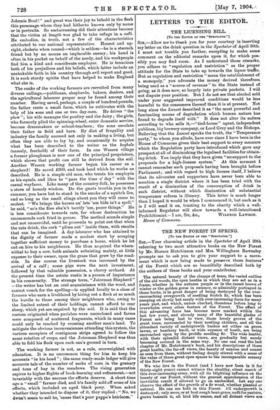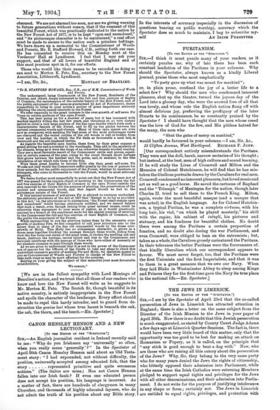[TO THE EDITOR OP THE "SPECTATOR. "] SIR,—Your charming article in
the Spectator of April 30th referring to two most attractive books on the New Forest by Mr. Horace Hutchinson and Mrs. Willingham Rawnsley . prompts me to ask you to give your support to a move- ment which is now being made to preserve those features• of the Forest which are so beautifully described both by the authors of these books and your contributor.
The natural beauty of the clumps of trees, the varied outline of the old woods, the open heaths in which they are set as in a frame, whether in the autumn purple or in the russet brown of winter or the golden gorse in summer, so admirably portrayed in these books, is in great danger of being destroyed by the ever- encroaching overgrowth of seedling Scotch fir, which has been creeping on slowly but surely with ever-increasing force for many years past, and which, unless checked, threatens before long to overwhelm every other feature of the Forest. The effect of this advancing force has become more marked within the last few years, and already many of the beautiful glades of Forest are being lost to view, those lovely groves of the great trees, surrounded by their nestling children, and all the attendant variety of undergrowth bushes set either on green lawns, or heathery knoll, or wide expanse of heath, are being encroached upon by the prolific seedling fir. The wide heaths, with their splendid distant views, are gradually but surely becoming covered in the same way. No one can read the last chapter of Mr. Hutchinson's book, and his descriptions of these great heaths; the far-off views, the beauty of sunrise and sunset as seen from them, without feeling deeply stirred with a sense of the value of these great open spaces to the incomparable scenery of the New Forest.
We who live in the Forest (and I have now been in it for thirty-eight years) cannot witness the stealthy, silent march of this ever-increasing army, with all its blighting influence on the beauty of our Forest, without the gravest apprehension of .the inevitable result if allowed to go on unchecked. Let any ono observe the effect of the growth of a fir wood, whether planted or natural. He can see both in this Forest. All undergrowth is destroyed ; only moss, or at best rough bent-grass, unfit for pasture, grows beneath it, all bird life ceases, and. all distant views are
obscured. We are not alarmed too soon, nor are we giving warning to future generations without reason, that if the remnant of this beautiful Forest, which was practically dedicated to the nation by the New Forest Act of 1877, is to be kept "open and unenclosed," and " its picturesque character is to be maintained," a real effort must be made to secure to the nation such a priceless hefitage. We have drawn up a memorial to the Commissioner of Woods and Forests, Mr. E. Stafford Howard, C.B., setting forth our case. He has consented to receive this on Monday next at the Verderers' Hall at Lyndhurst. I feel that I may ask your support, and that of all lovers of beautiful England and of this most precious spot in it, for our efforts.
Those who would like their names to be recorded as doing so can send to Morton K. Peto, Esq., secretary to the New Forest Association, Littlecroft, Lyndhurst.
"To E. STAFFORD HOWARD, Esq. C.B., one of H.M. Commissioners of Woods and Forests. The undersigned, being Commoners of the New Forest, Residents of the District, and others deeply interested in the fall and free exercise of Rights of Common, the maintenance of the natural beauty of the New Forest, and of the public enjoyment of the same as guaranteed by Act of Parliament, desire respectfully to bring to your notice a matter of great importance seriously affecting the above named interests in the Forest.
We refer especially to the great increase in the over-growth of self-sown Fir Trees on certain portions of the open Forest.
This has been going on for a number of years, but it has increased with marked rapidity within the last few years, and threatens at no very distant period to cover a very large portion of the fine open heaths which form such a characteristic feature of the Forest, and to fill up the glades between the natural ornamental woods and clumps. Many of these open spaces are even now so overgrown with seedling Fir that some of the most picturesque views are obscured and the varied outline of the old woods is lost or hidden from view and the heather, in which the Fir finds so favourable a seed bed, is destroyed and the soil rendered barren. As regards the beautiful open heaths, theta+ form by their great expanse a grand setting for and a contrast to the woodlands. They add to the salubrity of the climate, being as it were the lungs of an otherwise densely wooded country. They are a most favourite resort of the Commoners' cattle and ponies, especi- ally at certain seasons of the year, owing to the sweet though short herbage that grows between the heather and the gorse, and, in summer, to the free circulation of air which rids them of the flies. Were these great heaths to become little else than great self-sown Fir Woods not only would the Commoners suffer greatly by the loss of pasture for their animals, but the public enjoyment of the Forest, whether by residents or strangers, who come in thousands to visit the Forest, would be most seriously impaired. We desire further most respectfully to point out that the New Forest Act of 1877 was passed for the express object of securing to the Commoners the full and free exercise of their Rights of Common in the open Forest outside the area reserved to the Crown for the purpose of planting, the preservation of the ancient and ornamental woods, and that regard should be had to the picturesque nature of the Forest. If this natural increase of self-grown Fir is allowed to continue unchecked the statutory provisions of the Act of 1877 that ' Except in so far as provided. in this Act, i.e. the provisions as to plantations, the Forest shall remain open and unenclosed' would. become practically nullified, and we cannot believe that such a result, even though arising from quasi natural causes, could be otherwise than repugnant to your sense of justice, as it would practically amount to a breach of the enactment made for the special purpose of securing to the Commoners the full and free exercise of their Rights of Common, and the public the enjoyment of the Forest. While representing to you the grievous injury done by the excessive over- growth of seedling Firs, we feel compelled to call your attention also to the injury done in many of the fine old ornamental woods by the dense over- growth of Holly. This Holly has no picturesque character, it grows in a dense masa together blocking the passage through these woods, hiding from view the fine boles and stems of the great trees, it chokes the seedling oak and beech, destroys the herbage, causes injury and loss to the Commoners, and seriously interferes with the passage of those who have either of necessity or for pleasure occasion to pass through these woods. As we are given to understand that it is not in the power of the Commoner nor of anyone but the Officers of the Crown to take any steps to check this undoubted excessive growth of seedling Fir and Holly, we therefore appeal to you as Commissioner of Woods and Forests in charge of the New Forest to take such steps as may be most effectual for the purpose. Relying on your giving the subject of this memorial your most favourable consideration,
We remain," [We are in the fullest sympathy with Lord Montagu of Beaulieu's action, and we trust that all those of our readers who know and love the New Forest will write as he suggests to Mr. Morton K. Peto. The Scotch fir, though beautiful in its native country, is entirely inappropriate in the New Forest and spoils the character of the landscape. Every effort should be made to repel this hardy intruder, and to guard from de- struction the genius loci whose true haunt is beneath the oak, the ash, the thorn, and the beech.—ED. Spectator.]











































 Previous page
Previous page